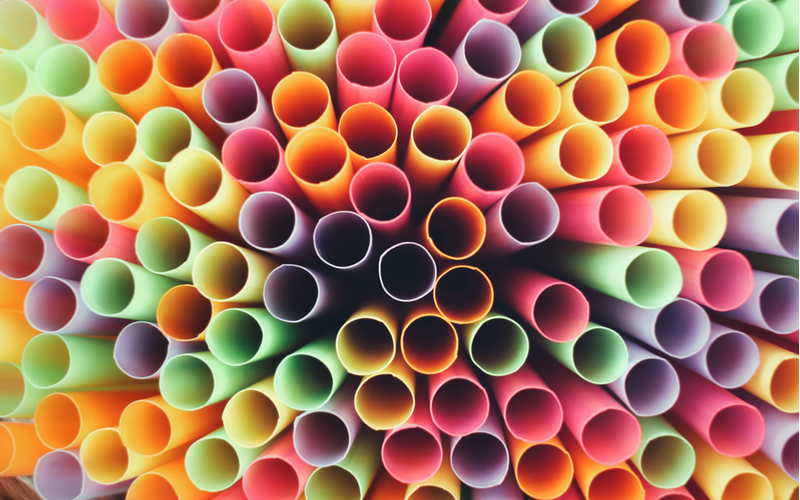Why the Sudden Frenzy Against Plastic Straws?
If you took a nice summer vacation, you might have missed the latest frenzy in American political culture: the huge movement to ban plastic straws. It’s real. Several cities in California have passed “straw-on-request” laws. Companies such as Starbucks have promised to eliminate them in two years, though one wonders how paper is going to fare when sucking up a hot latte. Signature petitions are alive all over the county.
I’ve even noticed that the wait staff at restaurants is reluctant even to give them out, as if giving you a convenient, clean, and effective way to drink your water is treading on dangerous territory.
My first theory was that this is the American prohibitionist culture run amok. We’ve seen this before. Never forget that this is the country that actually believed that an amendment to the Constitution could achieve the complete banishment of alcohol production and consumption. Several generations later, the attempt was made – without an amendment – to ban a weed that people like because it makes people feel light headed.
Then there is the penchant for pointless restrictionism, which has led to the ruination of our plumbing in our homes. Toilets don’t work. Showers are terrible. Our washing machines barely function. Our pipes are clogged because not enough water flows through them. Our hot water heaters are more like tepid water warmers.
What leads to this political culture of bans, restrictions, controls, and micro-management of our lives from above? You could say it is the boredom that comes with hyper-prosperity. Maybe it is some innate desire to control what other people should do, something shared by both the left and right side of the political spectrum. Maybe it’s the unleashing of the unconstrained vision, in Thomas Sowell’s memorable phrase.
Academy Award
Reflecting on all of this, I finally watched the video. It’s the one with the turtle getting a straw removed from its nose. You couldn’t produce a more compelling, dramatic, and emotionally manipulative video by the best Hollywood producer. It has all the ingredients that make for viral videos. It has a homemade quality. It is spontaneous. It has the gradual reveal. It features a stunningly beautiful sea turtle with a nice personality.
It’s hard to stop watching. When the nose of the turtle starts to bleed, even the most hardened heart begins to break. The turtle makes sneezing noises. Its eyes are big and beautiful. You feel the turtle’s pain as if it were your own. You are with the rescuers as they decide what to do: clip the straw, leave it in because it might be embedded in the brain, or keep pulling until it is set free.
To top it off, the battery on the phone that is doing the recording is dying. It’s the perfect combination to causing wincing and heart racing.
The film is so good that I’m actually reluctant to give away the end. So spoiler alert: they get the full straw out. It is the most glorious moment. You just smile. You want even to cheer. The whole experience is absolutely unforgettable. And the researchers end with a call for a complete ban on the plastic straw.
You can watch it now if you haven’t already. But I warn you: you cannot unwatch it.
The film was released in 2015. Today it has 33 million views! It took three years to go from obscure to mainstream.
What we have here is an amazing example of politics via viral video. We are making decisions affecting the lives of millions of consumers and businesses based on a politically powerful video about a straw in the nose of a single sea turtle.
I both get it and I do not. You can watch this and think: how incredibly uncanny that such a straw ended up in the nose of this turtle! How enormously fortunate it is for this pretty animal that these researchers found it and fixed the problem! We could leave it at that, and also not reflect on the reality of sea life. Every minute is a calamity of suffering and bloodshed, as billions of creatures devour other creatures constantly.
But we don’t leave it there, as rational people might. Instead we go from “sad/happy fate of one turtle” to “let’s massively impose on the liberties and property of every business and reverse the forward path of market-based products to cause an overall downgrade in the quality of life.”
Market Failure?
Now we have a whole industry of writers who are glad to tell us that we’ve all made a mistake. We don’t need plastic straws anyway. Paper and steel are just fine. “On rational grounds, the plastic straw can’t be justified, at least in the vast quantities that they are currently used,” writes Bee Wilson in the Wall Street Journal, as if she is personally wiser than the whole of the market and every consumer.
Let’s march through some myths as discovered by the Competitive Enterprise Institute.
- 500 million straws are not used daily. Instead the number is closer to 175 million;
- Plastic in the oceans is a problem but only 1% comes from the US, and a tiny percent are straws;
- The vast majority of straws end up in landfills;
- People with disabilities absolutely depend on plastic straws;
- Nearly half the plastic waste in oceans is from fish nets;
- Plastic is more sanitary than the alternatives;
- Plastic is better for the environment than the alternatives;
- Plastic is more economical than the alternatives.
At some level, it seems preposterous to have to make such arguments. The market is better at selecting the products we use, based on resource availability and functionality, than governments or activists. But some people need a cause, and government is there to entice them to believe that through the right uses of power, the world can be made a better place.
And yes, I’m glad that sea turtle no longer has a straw up his nose. I hope he wasn’t quickly eaten by a shark, which is the leading predator of these animals.











